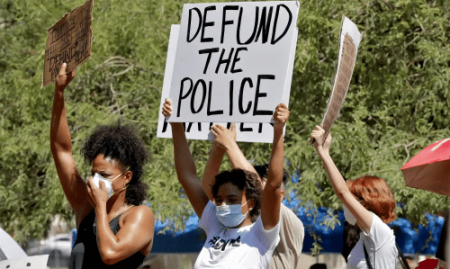
I want to defund the police. So do many friends, especially friends in Iowa City. The idea even made it onto our political agenda this summer. If only briefly. But Iowa City doesn’t represent the nation. Do other places have people who want to defund the police?
It turns out Iowa City politics are pretty misleading. And it’s all symptomatic of how we leftists read the public mood. Leftists don’t really know who’s on their team, and this ultimately amounts to one of the biggest problems with leftist electoralism. Why do leftists do this? They confuse their own friends and social circles for the public at-large. This comes out especially well on issues like trying to defund the police.
We know the liberal bubble is a thing. But it’s not just liberals. There are leftist bubbles, too. And these bubbles harm our efforts at building movements.
Leftist Electoralism
I won’t review the woes of leftist electoralism too much here. It’s a frequent topic of this blog. In the past, I discussed the Bernie Sanders coalition. I pointed out the narrowness of the Elizabeth Warren coalition. I’ve also focused on voters of color, both in terms of votes and misconceptions.
But I’ll sketch the big picture. Leftists think they’re a quickly growing group ready for electoral power. In the process of building that power, they drastically over-estimate their numbers. Not only do they over-estimate their numbers, they also use labels to cover over areas of disagreement. The ‘progressive’ label, for example, ignores many things we don’t have in common. And then these differences erupt at bad times.
At a minimum, we can find one group of ‘progressives’ who are: young, racially diverse, and working-class or barely middle-income. They’re very open to radical new ideas, largely because they lack access to good health care and the basic respect and dignity the U.S. claims to offer. And then we can find another group of ‘progressives’ who are: in their 30s, 40s, and 50s, middle-income and above, highly educated, overwhelmingly white, and long-term Democrats.
The former group largely voted for Bernie Sanders. A few in the latter group did, too, but many voted for Warren. Had Sanders united the two groups into a single coalition, he’d have come closer to winning the 2020 nomination. But the fact remains that this is a pretty narrow slice of America. It’s not more than about 15-20% of the country. And it’s nowhere near a political majority.
Defund the Police
We can see all this clearly with the leftist goal to defund the police. I’ve seen lots of leftist commentary – ranging from friends to total strangers – claiming that “the people” want to defund the police or that Democratic politicians need to get on board with the demand in order to satisfy voters. They say Joe Biden won’t listen to them, much at his own peril in the 2020 election. They believe Biden is more likely to lose if he supports more funding for police training.
In some sense, I can’t blame them for this. From their own friend circles, all this is true. Perhaps it’s even true in very progressive-leaning communities like Iowa City. But is this true about Americans in general? Is the electoral advice to Biden correct?
No. Not even in the slightest. Overwhelmingly, Americans want to keep police funding at current levels or increase it. Biden’s official campaign position pretty closely matches where most Americans stand on the issue. From a policy perspective, Biden is wrong. Very wrong. But from an electoral perspective, he takes the position on police funding likeliest to maximize his chances of winning.
Furthermore, this isn’t just an issue of ‘average Americans’ or ‘white Americans’ supporting police funding. Americans of all races, including black Americans, oppose the ‘defund the police’ slogan.
New York Time Poll on ‘Defund the Police’
Let’s take a look at some recent polling data from the New York Times. In this poll, they ask swing-state residents whether they want to decrease, maintain, or increase police funding levels. They find that only about 25% of Americans want to defund the police. The other 75% or so want to maintain or increase funding.
Note this sounds suspiciously similar to the percentage of the electorate that’s part of the current leftist electoral coalition. And so, while the left has grown quite a bit over the last decade, it’s still no more than about one-fifth the total electorate, with a few more people sympathetic to the left on specific issues.
But let’s also look at the breakdown by race:

The data show that black and Hispanic Americans are about twice as likely as white Americans to support defunding the police. But support among all racial groups is well under 50%. Even only about a third of black and Latinx Americans want to defund the police. Furthermore, ideology and partisanship probably explain many of the racial differences. Taking conservative Republicans out of the sample probably leaves us with identical data across racial groups.
What are the lessons here? The main lesson is that the left needs to know the score if it’s going to play the game. As leftists, we’re behind on the issue of defunding the police. That doesn’t mean we give up. But it does mean leftists need different strategies to win. Appealing to Biden’s electoral chances won’t cut it. We don’t have him on that issue.